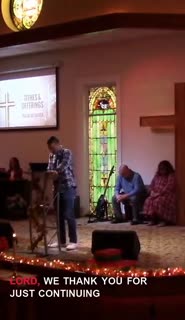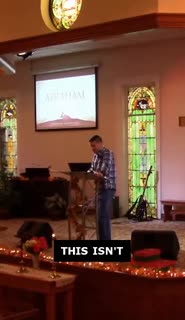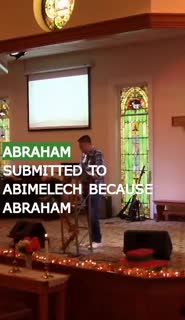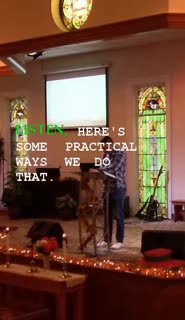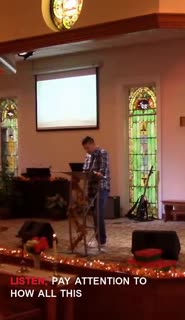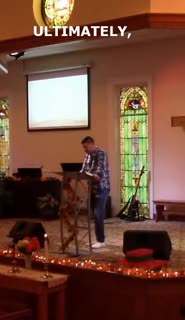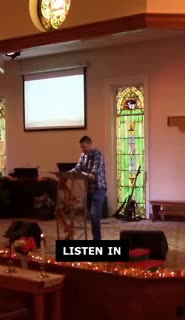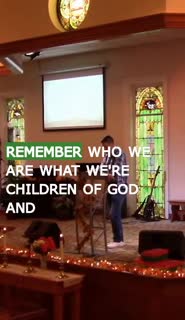Reflecting God's Glory Through Integrity and Faithfulness
Summary
In today's gathering, we focused on the importance of living a life that reflects God's glory and faithfulness, especially in a world that often seems dark and challenging. We began by acknowledging the power of prayer and the need to lift up those who are sick or in need, both within our community and beyond. We celebrated recent salvations and prayed for the continued growth and strength of new believers, emphasizing the role of the church in nurturing faith and spreading the gospel.
We then turned to Genesis 21, exploring the story of Abraham and Abimelech. This passage highlights the significance of expository preaching, which allows us to delve deeply into scripture and uncover its relevance to our lives today. In the context of recent elections, we discussed how the Bible guides us in responding to political and social issues with integrity and faithfulness. Abraham's interactions with Abimelech serve as a model for how Christians should engage with the world: living with integrity, dealing with conflict peacefully, and maintaining a distinct identity as God's people.
We are reminded that our allegiance is to God, not to any earthly power or political party. Our lives should reflect the values and priorities of God's kingdom, and we should strive to be a blessing to society by manifesting God's grace. This involves living with integrity, seeking justice, and engaging with the world in a way that honors God. As we navigate the complexities of life, we are called to be faithful witnesses, trusting in God's provision and sovereignty.
Key Takeaways:
- Prayer and Dependence on God: We are reminded of the power of prayer and our dependence on God for healing, guidance, and strength. As we lift up those in need, we trust in God's will and power to work in their lives and ours. Our prayers should be rooted in faith, knowing that God is omnipotent and omnipresent. [23:41]
- Living with Integrity: Abraham's story teaches us the importance of living a life of integrity, even when dealing with those who may not share our beliefs. Our actions should reflect God's character, and we should strive to be trustworthy and honorable in all our dealings. This integrity is a powerful witness to the world of God's presence in our lives. [45:30]
- Peaceful Conflict Resolution: As believers, we are called to deal with conflict peacefully, seeking justice and fairness in our interactions. Abraham's approach to resolving disputes with Abimelech demonstrates the importance of addressing wrongs while maintaining a commitment to peace. Our pursuit of justice should be grounded in the gospel and reflect God's love and truth. [54:36]
- Distinct Identity as God's People: While we engage with the world, we must remember that we are called to be separate and distinct as God's people. Our allegiance is to God, and our lives should reflect His values and priorities. We are to be in the world but not of it, maintaining our identity as followers of Christ. [01:02:55]
- Trusting in God's Provision: Abraham's faithfulness and trust in God's promises serve as a reminder that we can rely on God's provision and sovereignty. Even in challenging circumstances, we are called to worship and trust in the everlasting God, knowing that He will supply our needs and guide us according to His will. [01:08:05]
Youtube Chapters:
[00:00] - Welcome
[23:41] - Prayer and Dependence on God
[25:05] - Praying for the Unreached
[26:12] - Laying Anxieties at the Cross
[27:09] - Offering and Worship
[28:01] - Introduction to Genesis 21
[36:22] - Importance of Expository Preaching
[38:02] - Abraham and Abimelech's Covenant
[40:21] - Church and State Relations
[43:44] - Living with Integrity
[45:30] - Abraham's Respectful Response
[48:26] - Respect for Authorities
[50:12] - Integrity in Daily Life
[52:13] - Dealing with Conflict Peacefully
[54:36] - Seeking Justice
[57:04] - Making Peace through the Gospel
[01:01:22] - Interacting with the World Differently
[01:02:55] - Distinct Identity as God's People
[01:08:05] - Trusting in God's Provision
[01:09:47] - Conclusion and Call to Faith
Study Guide
Bible Study Discussion Guide
Bible Reading:
- Genesis 21:22-34
---
Observation Questions:
1. What was the nature of the covenant between Abraham and Abimelech, and what prompted its formation? [38:02]
2. How did Abraham demonstrate integrity in his interactions with Abimelech, and what was Abimelech's response to this integrity? [45:30]
3. What role did the well of water play in the conflict between Abraham and Abimelech, and how was it resolved? [54:36]
4. How does the passage describe Abraham's relationship with God, particularly in the context of his interactions with Abimelech? [01:08:05]
---
Interpretation Questions:
1. How does Abraham's approach to conflict resolution with Abimelech reflect the biblical principle of seeking peace and justice? [54:36]
2. In what ways does the story of Abraham and Abimelech illustrate the importance of living with integrity as a witness to God's presence in our lives? [45:30]
3. How does the covenant between Abraham and Abimelech serve as a model for how Christians should engage with secular authorities and society today? [43:44]
4. What does Abraham's planting of the tamarisk tree symbolize in terms of his faith and trust in God's provision and promises? [01:08:05]
---
Application Questions:
1. Reflect on a recent situation where you had to resolve a conflict. How did you approach it, and what could you learn from Abraham's example of seeking peace and justice? [54:36]
2. Consider your daily interactions with others. How can you demonstrate integrity in a way that reflects God's character and serves as a witness to those around you? [45:30]
3. In what ways can you engage with political and social issues while maintaining your distinct identity as a follower of Christ? How can you ensure your allegiance remains with God above all else? [01:02:55]
4. Think about a time when you felt challenged to trust in God's provision. How did you respond, and what steps can you take to strengthen your faith in God's promises? [01:08:05]
5. Identify a specific area in your life where you can be a blessing to others by manifesting God's grace. What practical actions can you take this week to live out this calling? [40:21]
6. How can you incorporate prayer into your daily routine to deepen your dependence on God for guidance and strength? Consider setting a specific time each day for focused prayer. [23:41]
7. Reflect on your current relationships and community involvement. How can you be a faithful witness to God's love and truth in these areas? What changes might you need to make to align more closely with God's values and priorities? [01:09:47]
Devotional
Day 1: The Power of Prayer and Dependence on God
Prayer is a vital aspect of the Christian life, serving as a direct line of communication with God. It is through prayer that believers express their dependence on God for healing, guidance, and strength. In a world filled with challenges and uncertainties, prayer becomes a source of comfort and assurance, reminding us of God's omnipotence and omnipresence. As we lift up those in need, both within our community and beyond, we trust in God's will and power to work in their lives and ours. Our prayers should be rooted in faith, knowing that God hears and responds according to His perfect plan. [23:41]
"Do not be anxious about anything, but in everything by prayer and supplication with thanksgiving let your requests be made known to God. And the peace of God, which surpasses all understanding, will guard your hearts and your minds in Christ Jesus." (Philippians 4:6-7, ESV)
Reflection: Think of a specific situation or person in your life that needs prayer. How can you commit to praying for them consistently this week, trusting in God's power and provision?
Day 2: Living a Life of Integrity
Integrity is a hallmark of a life that reflects God's character. Abraham's story in Genesis 21 illustrates the importance of living with integrity, even when interacting with those who may not share our beliefs. Our actions should be trustworthy and honorable, serving as a powerful witness to the world of God's presence in our lives. In every interaction, whether personal or professional, we are called to reflect God's character, demonstrating honesty, reliability, and moral uprightness. This integrity not only honors God but also builds trust and respect with others. [45:30]
"Whoever walks in integrity walks securely, but he who makes his ways crooked will be found out." (Proverbs 10:9, ESV)
Reflection: Identify an area in your life where you struggle to maintain integrity. What steps can you take today to align your actions with God's character and demonstrate integrity in that area?
Day 3: Peaceful Conflict Resolution
As believers, we are called to resolve conflicts peacefully, seeking justice and fairness in our interactions. Abraham's approach to resolving disputes with Abimelech in Genesis 21 serves as a model for addressing wrongs while maintaining a commitment to peace. Our pursuit of justice should be grounded in the gospel, reflecting God's love and truth. In a world often marked by division and hostility, Christians are called to be peacemakers, demonstrating the reconciling power of the gospel in their relationships. [54:36]
"Blessed are the peacemakers, for they shall be called sons of God." (Matthew 5:9, ESV)
Reflection: Think of a recent conflict or disagreement you have experienced. How can you apply the principles of peaceful conflict resolution to seek reconciliation and demonstrate God's love in that situation?
Day 4: Maintaining a Distinct Identity as God's People
While engaging with the world, Christians must remember their distinct identity as God's people. Our allegiance is to God, and our lives should reflect His values and priorities. We are called to be in the world but not of it, maintaining our identity as followers of Christ. This involves living according to the principles of God's kingdom, even when they conflict with societal norms or expectations. By doing so, we become a light in the darkness, pointing others to the hope and truth found in Christ. [01:02:55]
"But you are a chosen race, a royal priesthood, a holy nation, a people for his own possession, that you may proclaim the excellencies of him who called you out of darkness into his marvelous light." (1 Peter 2:9, ESV)
Reflection: Reflect on an area of your life where you feel pressure to conform to the world. How can you reaffirm your identity in Christ and live out His values in that area today?
Day 5: Trusting in God's Provision
Abraham's faithfulness and trust in God's promises remind us of the importance of relying on God's provision and sovereignty. Even in challenging circumstances, believers are called to worship and trust in the everlasting God, knowing that He will supply their needs and guide them according to His will. Trusting in God's provision involves surrendering our fears and anxieties to Him, confident that He is in control and working for our good. This trust is not passive but active, as we continue to seek His guidance and follow His leading in our lives. [01:08:05]
"And my God will supply every need of yours according to his riches in glory in Christ Jesus." (Philippians 4:19, ESV)
Reflection: Consider a current challenge or need in your life. How can you actively trust in God's provision and sovereignty, and what steps can you take to align your actions with His will?
Quotes
Here are the selected quotes with timestamps:
"We come to you because not only are we your children, but we come to you because we depend in you and on you. We know that there's nothing that you can't do. And so, Lord, we come to your throne and we lay everything at your feet, trusting in your will and your power." [00:23:49]
"Lord, we thank you for just continuing to use us. Lord, these three salvations just a week and a half ago, that's evidence that you are moving in our body, that you're using us for your kingdom, for your glory. I mean, Lord, you're the only one that can take what's dead according to scripture and give it life." [00:24:14] (23 seconds)
"This isn't Abraham's land yet. And listen, what we see here, this exchange between the two of them, it demonstrates how Christians are to respond to whatever government that they're a part of. And as we walk through this, we're reminded that in keeping with God's original promise to bless all the families of the earth through Abraham, remember Genesis, chapter 12 we're reminded that likewise today we're to manifest the grace of god to the world by being a channel of blessing to society that's how we honor god." [00:43:47] (32 seconds)
"Abraham submitted to Abimelech because Abraham knew that would bring God glory. He trusted in God's plan. He'd already tried to take things into his own hands with his children. And how did that end? Poorly. So he says, okay, God says I'm going to have this land. I'm going to trust it's in God's timing. I will submit to you, Abimelech. I will not do wrongly by you." [00:48:04] (24 seconds)
"Listen, here's some practical ways we do that. It's not just about keeping our promises like we see here with Abraham, but it's also how we live our lives. It's how we treat things like marriage. I mean, we hold the marriage vow in high esteem. People see that. That allows us to live a life of integrity. It's how we encourage. It's how we encourage sexual purity among believers." [00:51:31] (26 seconds)
"Guys, in dealing with conflict, we bring peace by giving this great example of the gospel, allowing people to see God in us, and then we seek justice in a world around us by discipling or teaching them what it is God's word says. And then living that out with integrity. And pay attention. Abraham, how he does it here, he does it boldly, he does it gracefully, he does it respectfully." [01:01:50] (24 seconds)
"Listen, pay attention to how all this ends our last point. We interact with the world differently. And these final verses, there's three things that I think really stand out for us here. First, we see, despite this mutual respect and cooperation that they have, despite this treaty that Abraham's made with a secular nation here, we see from the text that God's people would and should remain separate and distinct from the world." [01:02:32] (23 seconds)
"Ultimately, worldly people, they'll respond in faith to the witness of Jesus's church, or they'll turn away and unbelief just as Abimelech and his general return to their pagan ways. James Boyce, he writes this. The church must be different from the world. It must be in the world for Christ has put it there." [01:02:52] (21 seconds)
"Listen in closing. As don't forget who you are. Don't forget who it is that you follow. We live in a land that's not our own. This isn't our home again. Be grateful for the blessings and the privileges that God's given us. Recognize the Lord's provision for you that again. The great. Blessings." [01:09:51] (26 seconds)
"Remember who we are what we're children of God and and we interact with the world in such a way that that makes much of Jesus, right? We live lives of integrity. We deal with conflict peacefully we but but in the end of it all that's just like this past week is the world turns back to go back to their idolatry to the things. They're giving their heart. Parts to." [01:10:20] (21 seconds)
